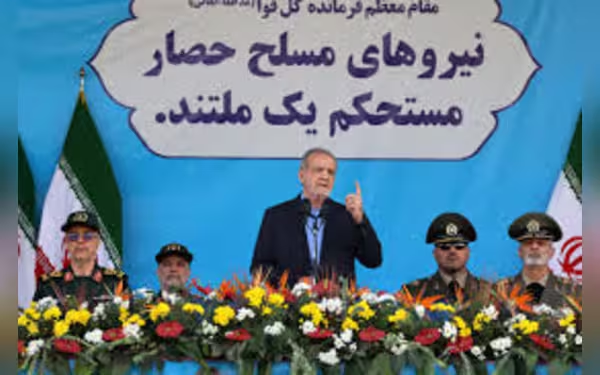Saturday, November 16, 2024 05:40 PM
Iran Supports Hezbollah While Avoiding Direct Conflict
- Iran backs Hezbollah amid rising Middle East tensions.
- Tehran seeks to avoid full-scale war with Israel.
- Iran warns of consequences for Israeli attacks.
 Image Credits: thefrontierpost
Image Credits: thefrontierpostIran supports Hezbollah while avoiding direct conflict with Israel amid escalating tensions in the Middle East.
As tensions rise in the Middle East, particularly between Israel and Hezbollah, Iran finds itself in a precarious position. The ongoing conflict has escalated significantly since Hamas's attack on Israel on October 7, leading to a series of retaliatory strikes and counterattacks. Iran, a key ally of Hezbollah, is attempting to support the group while simultaneously avoiding a direct military confrontation that could lead to a larger war.
In recent weeks, cross-border fire has intensified, particularly after a tragic incident where 39 people were killed due to sabotage on Hezbollah's communications. This prompted Israeli air strikes on Hezbollah strongholds in Lebanon, resulting in hundreds of casualties. In response, Hezbollah launched rocket barrages against Israel. Despite these developments, Iranian officials, including political experts, have emphasized that Iran will not be drawn into a full-scale war. Hamid Gholamzadeh, an Iran-based political analyst, stated, "Iran is not going to be pulled into war." This sentiment reflects Iran's cautious approach as it seeks to navigate the complex geopolitical landscape.
Iran's strategy appears to focus on projecting power without direct engagement. Ali Vaez from the International Crisis Group noted that any escalation could inadvertently benefit Israel and impact the upcoming U.S. elections. He remarked, "Iran does not want to play into its arch-enemy’s hands," highlighting Tehran's priority of securing relief from crippling sanctions and stabilizing its economy.
Even during its first direct attack on Israel in April, which was a response to an air strike on its embassy annex in Damascus, most of Iran's missiles were intercepted. This indicates a level of restraint and a desire to avoid a broader conflict. Iranian President Masoud Pezeshkian, speaking in New York, accused Israel of warmongering while portraying Iran as a nation that is exercising restraint. He mentioned that Iran had refrained from retaliating after the killing of Hamas leader Ismail Haniyeh, fearing it could jeopardize U.S. efforts for a ceasefire in Gaza.
Despite the ongoing hostilities, Iran continues to support Hezbollah. Foreign Minister Abbas Araghchi warned that Tehran would "not remain indifferent" to Israeli attacks. Furthermore, Iran has called on the UN Security Council to take immediate action, warning of "dangerous consequences" for Israel. The Iranian leadership, including Supreme Leader Ayatollah Ali Khamenei, has expressed concern over the loss of Hezbollah fighters but remains committed to supporting the group.
Political analysts suggest that while Iran is evaluating its support for Hezbollah, the group possesses significant resources that make it resilient. Gholamzadeh pointed out that Hezbollah's capabilities ensure it will not be easily defeated, emphasizing the importance of continued support. Vaez also noted that recent attacks on Hezbollah's communications may have weakened the group, but it would not be completely incapacitated even if its leadership faced significant losses.
Iran's careful balancing act of supporting Hezbollah while avoiding direct conflict with Israel reflects its broader strategic goals. The nation is keenly aware that a full-scale war could derail its efforts to alleviate economic sanctions and stabilize its economy. As the situation continues to evolve, the international community watches closely, understanding that the implications of this conflict extend far beyond the borders of the Middle East. The delicate interplay of power, restraint, and strategic interests will undoubtedly shape the future of the region.













